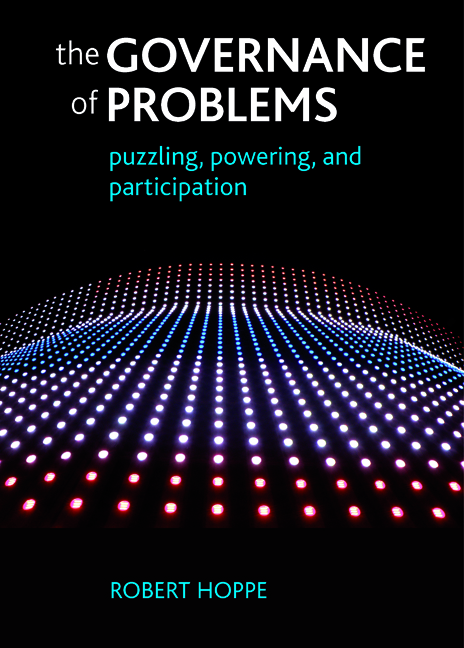Book contents
- Frontmatter
- Dedication
- Contents
- List of boxes, figures and tables
- About the author
- Preface
- one A problem-processing perspective on governance
- two The governance of problems: a map
- three Analysing policy problems: a problem-structuring approach
- four Cultures of public policy problems
- five Problem types and types of policy politics
- six Problem-structuring dynamics and meta-governance
- seven Making policy analysis doable and reflexive
- eight The plural democracies of problems: a meta-theory
- nine Public engagement and deliberative designs
- ten Responsible and hopeful governance of problems
- Bibliography
- Index
six - Problem-structuring dynamics and meta-governance
Published online by Cambridge University Press: 01 September 2022
- Frontmatter
- Dedication
- Contents
- List of boxes, figures and tables
- About the author
- Preface
- one A problem-processing perspective on governance
- two The governance of problems: a map
- three Analysing policy problems: a problem-structuring approach
- four Cultures of public policy problems
- five Problem types and types of policy politics
- six Problem-structuring dynamics and meta-governance
- seven Making policy analysis doable and reflexive
- eight The plural democracies of problems: a meta-theory
- nine Public engagement and deliberative designs
- ten Responsible and hopeful governance of problems
- Bibliography
- Index
Summary
To be a man, then, is to be one who inhabits institutions in such a way that he preserves them even while transforming through his own initiative. (Dauenhauer, 1986: 135)
Introduction
This chapter explores a theory of problem-structuring dynamics. It follows the structuration logic proposed by Giddens (1979), showing how policy actors can influence the nature of institutionalised systems of interaction while at the same time being constrained by them. On the one hand, problem-frame shifts and the possibilities for policy change depend on the structure of policy networks. A closed, institutionalised policy network differs from an open, emergent or decaying network. Part of the difference is in shaping different types of policy-making processes, with different capacities for problem processing, and, therefore, speed, scope and direction of policy change and innovation. On the other hand, problemframe shifts and policy change depend on the actions of players in the network. The policy players are constrained, but also exploit the opportunities offered by the network structures. Some policy players may come to see an existing policy network as insufficiently geared to the emergent new problem framing and the solutions it is generating. Hence, they may engage in interventions that gently nudge a policy network to change from one type to another, with concomitant changes in opportunities and possibilities for policy change. This reflects a sort of policy entrepreneurship, occasionally amounting to institutional and intellectual entrepreneurship, which may be called the meta-governance of problems. It operates on a higher level than ‘ordinary’ policy entrepreneurship.
This chapter serves a triple purpose. First, the types of policy politics introduced in the previous chapter are clarified and illustrated through four case examples. Second, it is shown how types of policy politics shift through time. Policy problemnetwork configurations are not static, but dynamic. Third, in the concluding section, attention is focused on this co-evolution of problem reframing and the shifts between types of policy politics. Transitions from one type to the next, whatever the other possible factors involved, apparently cannot be explained unless taking into account the meta-governance interventions of some policycum-institutional entrepreneurs.
Structuring the policy problem: prenatal screening in the Netherlands (1990-2007)
Medical-technological possibilities for genetic screening and early warning for lethal diseases or diseases with severe negative impacts on quality of life have increased considerably.
- Type
- Chapter
- Information
- The Governance of ProblemsPuzzling, Powering and Participation, pp. 145 - 166Publisher: Bristol University PressPrint publication year: 2010

